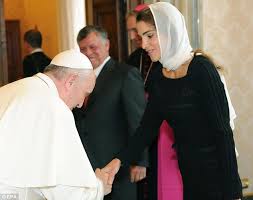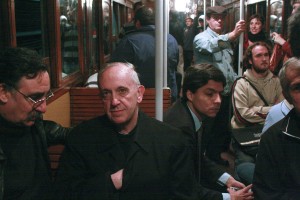In the third and final leg of the trilogy, Fr. Frank Johnson takes a close look at the Pope’s pronouncements on the Role of Women in the Church, and The Church in relation to the poor of the world. Both subjects are given special mention in Pope Francis’ ‘Joy of the Gospel’, and, because of this, they deserve special consideration. Please read on.
Fr. Jonathan
The Role of Women:
Pope Francis also addresses another hot potato, i.e. the role of women in the Catholic Church, he says:
‘The Church acknowledges the indispensable contribution which women make to society through the sensitivity, intuition and other distinctive skill sets which they, more than men, tend to possess. I think, for example, of the special concern which women show to others, which finds a particular, even if not exclusive, expression in motherhood. I readily acknowledge that many women share pastoral responsibilities with priests, helping to guide people, families and groups and offering new contributions to theological reflection. But we need to create still broader opportunities for a more incisive female presence in the Church. Because “the feminine genius is needed in all expressions in the life of society, the presence of women must also be guaranteed in the workplace”[72] and in the various other settings where important decisions are made, both in the Church and in social structures… Demands that the legitimate rights of women be respected, based on the firm conviction that men and women are equal in dignity, present the Church with profound and challenging questions which cannot be lightly evaded. The reservation of the priesthood to males, as a sign of Christ the Spouse who gives himself in the Eucharist, is not a question open to discussion, but it can prove especially divisive if sacramental power is too closely identified with power in general. It must be remembered that when we speak of sacramental power “we are in the realm of function, not that of dignity or holiness”.’
The poor:
Right at the start of his papacy, Pope Francis, even by the very choice of his name, has said the Church ought to be Church for the poor, and he dedicates a long section of the document to the question of poverty. ‘In all places and circumstances,’ he says, ‘Christians, with the help of their pastors, are called to hear the cry of the poor… The need to resolve the structural causes of poverty cannot be delayed, not only for the pragmatic reason of its urgency for the good order of society, but because society needs to be cured of a sickness which is weakening and frustrating it, and which can only lead to new crises. Welfare projects, which meet certain urgent needs, should be considered merely temporary responses. As long as the problems of the poor are not radically resolved by rejecting the absolute autonomy of markets and financial speculation and by attacking the structural causes of inequality, no solution will be found for the world’s problems or, for that matter, to any problems. Inequality is the root of social ills.’
Francis also issues a warning: ‘Any Church community, if it thinks it can comfortably go its own way without creative concern and effective cooperation in helping the poor to live with dignity and reaching out to everyone, will also risk breaking down… It will easily drift into a spiritual worldliness camouflaged by religious practices, unproductive meetings and empty talk.’
Evangelii Gaudium is a long and detailed document which I would recommend you to read in its entirety. It is a meditation, a call to conversion and deep reflection on the signs of our times.
Pope Francis does not mind using public transport – what positive changes he is wringing!”



